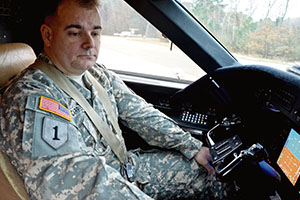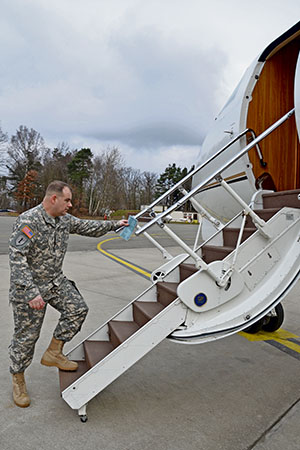
As U.S. Army Chief Warrant Officer 4 Robert Carpenter walks around the twin-
engine C-20 Gulfstream, he glances at his safety checklist — a routine he’s done every time he’s flown.
Soldiers and civilian maintenance workers stop to talk to him as he boards the jet plane and climbs forward into the cockpit.
“It’s bittersweet that this will be my last flight in the Army,” Carpenter said. “I’m going to miss the camaraderie.
Carpenter, a pilot for the U.S. Army Priority Air Transport Command, Europe Detachment, is part of an elite team of Army pilots and flight stewards who are responsible for flying senior leaders, Congressmen and other dignitaries. After
nearly 28 years in uniform, Carpenter will soon retire, leaving behind a storied military aviation career.
“I’m lucky to be working with professionals,” Carpenter said. “I’m lucky to be here. In a lot of situations, previously in combat, I should have been dead.”
He first enlisted in the Marine Reserves in 1985. On active duty, he maintained helicopters before joining the U.S. Army as a warrant officer. At Fort Rucker, Ala., he learned to fly the UH-1 Iroquois, known commonly as a Huey. He then flew the AH-1 Cobra and the OH-58 Delta, the Kiowa Warrior.

On his right arm, Carpenter wears the 1st Infantry Division combat patch. While taxiing out of the hangar, he recalled how on April 7, 2004, he was shot down in Iraq’s Diyala province, northeast of Baghdad. He and his co-pilot, a female lieutenant, were flying over Baqubah when the enemy attacked with small arms fire and rocket propelled grenades.
Three RPGs targeted the helicopter and one struck a rotor blade. A U.S. Special Forces team below watched as the aircraft began tearing itself apart.
“I didn’t think we were going to make it. I made a mayday call,” Carpenter recalled, his voice drifting off. “We thought we were dead.”
Yet, seven seconds later, they landed in a vacant lot and began to evade hostile forces. Carpenter commandeered an Iraqi’s vehicle to aid their escape, just as friendly forces arrived.
“As I was jumping in, I heard the screeching tires of Humvees coming around the corner. Three Humvees from an MP unit showed up,” Carpenter said.
He later flew a Dash 7 airplane with the 204th Military Intelligence Battalion during four more Iraq tours and served with USAPAT in Afghanistan.
On the Feb. 21 training flight, Chief Warrant Officer 5 Fernando Avila was at the controls beside Carpenter. He recalled the many times they’ve flown together.
“It’s a privilege to do this last flight with him,” Avila said. “After almost 28 years of military service, he deserves credit for serving our nation.”
Last year, while landing at Al Udeid Air Base, near Doha, Qatar, malfunction warnings appeared on their controls. It was a wiring problem, Avila said. Nine other elements failed. But Carpenter remained calm under pressure.
“He got the airplane stopped and we got the passengers to where they needed to be,” Avila said. “It’s a good feeling to know the level of professionalism and knowledge that he has is there to help you when these things happen.”
Carpenter met his wife Jill in Korea, where she was also in the military. They’ve been married 13 years and have two sons, Dakota and Skylar. Carpenter’s final Army flight signals the start of a new chapter in their lives, she said.
They have plans to depart Germany in June and he’ll retire in November, she said. Carpenter may fly airplanes as a civilian contractor or return to helicopters, something he misses, he said.
“Through it all, we overcame a lot of heartache with deployments,” Jill Carpenter said. “But, most of all, we’re happy.”


